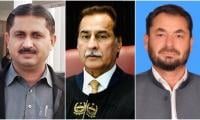ISLAMABAD: The Economic Coordination Committee (ECC) of the newly formed federal cabinet met here on Wednesday, but Finance Minister Asad Umar was unable to take decisions on any of the five issues tabled for discussion because the issue of circular debt and its crippling impact on the energy sector consumed most of the time allocated.
Minister for Finance Asad Umar and all other participants in the ECC meeting were shocked by the Power Division's presentation on the status of Pakistan's circular debt, which has surged to a record Rs1,178 billion. The payables of the power sector stand at Rs.596 billion, with an increase of Rs30 billion in July alone. Another Rs582 billion of debt has been parked with the Power Holding Private Company Limited, a purpose-built vehicle. The Power Division pointed out that the National Electric Power Regulatory Authority (NEPRA) determines the power tariff on the assumption of 100 percent bill recovery, whereas the actual recovery stands at 90 percent, adding Rs120 billion a year to the circular debt. Railways Minister Sheikh Rashid Ahmed noted that the non-participation of NEPRA officials in the ECC meeting stymied any conclusive examination of the issue.
With the matter unresolved, the ECC decided that the finances of the power sector would continue to be managed with the budgeted subsidy until further notice.
The 90-minute discussion of the circular debt meant that the ECC deliberations on a mammoth increase in natural gas prices, proposed by the Petroleum Division, could not be completed and had to be deferred until the next meeting of the ECC.
The Petroleum Division had proposed a 186 percent increase in prices for domestic consumers and a 30 percent hike for the industrial, commercial, fertiliser and power generation sectors. State-owned gas utilities wanted the ECC to pass the additional Rs123 billion cost of the proposed price rise on to the consumer. Instead, Wednesday's meeting was remarkable for the poignant questions posed to senior officials by the finance minister. He asked them about the cumulative financial impact of no increase in gas prices over the last four years. He also asked how the gas industry had been kept afloat after it was starved of liquidity. “Did the government continue to subsidise the gas price, or did it arrange loans from commercial banks to maintain the gas price,” Umar asked, according to sources familiar with the proceedings held behind closed doors.
The minister’s diligence on each issue under discussion by the ECC surprised all the officials in attendance, indicating that none of the proposals submitted by them for approval on Wednesday and in the future would be routinely approved.
At the meeting, a summary seeking the release of Rs60 billion to Pakistan State Oil (PSO) for the payment of liabilities to foreign fuel suppliers was discussed. The receivables of PSO have skyrocketed to Rs325.8 billion and the Secretary to the Finance Ministry favoured an initial disbursement of Rs10 billion. Instead, this was deferred because Umar demanded a detailed explanation of how PSO had accumulated so much debt.
The finance minister expressed displeasure at the shortage of fertilisers ahead of crop sowing for the Kharif season. The ECC was informed that 600,000 tons of fertiliser was needed to meet demand. The ECC formed a committee led by Abdul Razak Dawood, Advisor to the Prime Minister on Industry and Production, to ascertain total national production and calculate the requisite quantum of imported fertilisers. The committee would present its findings to the ECC at its next meeting.
Umar told officials that the public has a right to to know the true quantum of the circular debt and should not be kept in the dark. The previous Pakistan Muslim League-Nawaz government used to play down the circular debt, quantifying it at a little over Rs500 billion - the payable amount, minus the loans and liabilities of the power sector, all of which are part of the circular debt.
The ECC identified the half-a-dozen key factors which accounted for the piling up of these liabilities. It formed committees to assess these factors and formulate solutions for presentation to the ECC at its forthcoming meeting next week.
The ECC would vet the proposed courses of action and present them to the federal cabinet for approval.
Umar told the participants that all the facts would be shared with the public to ensure decision making process was transparent and inclusive.
It seems as if the people of Karachi have been left at the mercy of dacoits and hard-core criminals whereas the...
Since the February elections, the provincial governments, especially those in Punjab and Khyber Pakhtunkhwa, have...
This letter refers to the news report ‘Air ambulance service to start in June: Maryam Nawaz’ . According to the...
Car-dependency, along with the pervasive absence of any facilities for pedestrians and cyclists during the road design...
Acid attacks are one of the worst forms of gender-based violence in Pakistan. The victims of these attacks are often...
I find it very disturbing that the imprisoned PTI head Imran Khan and other senior party figures are often repeating...







